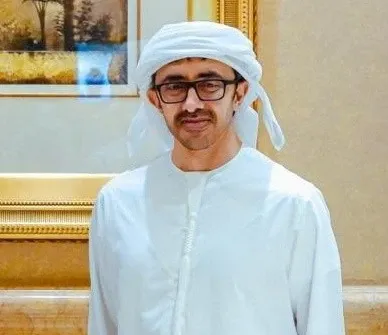What Did UAE Deputy PM Say About India-Pak Tensions?

Synopsis
Key Takeaways
- UAE's Deputy PM calls for restraint.
- Importance of dialogue and diplomacy emphasized.
- Operation Sindoor targets terror infrastructure.
- Need for stabilization in South Asia.
- International support for peaceful resolutions.
Abu Dhabi, May 7 (NationPress) Sheikh Abdullah bin Zayed Al Nahyan, the Deputy Prime Minister and Minister of Foreign Affairs of the UAE, has urged both India and Pakistan to practice restraint and work towards de-escalating tensions to prevent further conflict, as stated by the nation's foreign ministry on Wednesday.
He emphasized the significance of listening to calls for dialogue and mutual understanding, which are essential to avert military escalation, bolster stability in South Asia, and curtail additional regional tensions, according to the statement from the UAE Ministry of Foreign Affairs.
He reiterated that diplomacy and dialogue are the most effective tools for peacefully addressing crises and fulfilling the collective aspirations of nations for peace, stability, and prosperity.
Furthermore, he highlighted that the United Arab Emirates will persist in its efforts to support all initiatives aimed at achieving peaceful resolutions to regional and international conflicts and alleviating their humanitarian impacts.
These remarks followed Operation Sindoor, executed by the Indian military against nine significant terror targets located in Pakistan and Pakistan-occupied Kashmir.
The Indian Army confirmed that the strikes were carefully planned and conducted, ensuring that no civilian or military infrastructure in Pakistan was harmed.
The operation was directed at infrastructure associated with terror groups responsible for the Pahalgam attack on April 22, which resulted in the deaths of 25 Indian nationals and one Nepali citizen in Jammu and Kashmir.
On Wednesday, the Indian government stated that it has exercised its right to respond to heinous acts of terror originating from the neighboring country.
In a press conference, Foreign Secretary Vikram Misri, along with Colonel Sophia Qureshi and Wing Commander Vyomika Singh, discussed 'Operation Sindoor,' asserting that India's response to the Pahalgam attacks was measured, calculated, and non-escalatory.
Real-time surveillance and post-strike evaluations confirmed the destruction of the targeted objectives.
Operation Sindoor represents one of India's most assertive cross-border military responses since the Balakot airstrikes in 2019.










